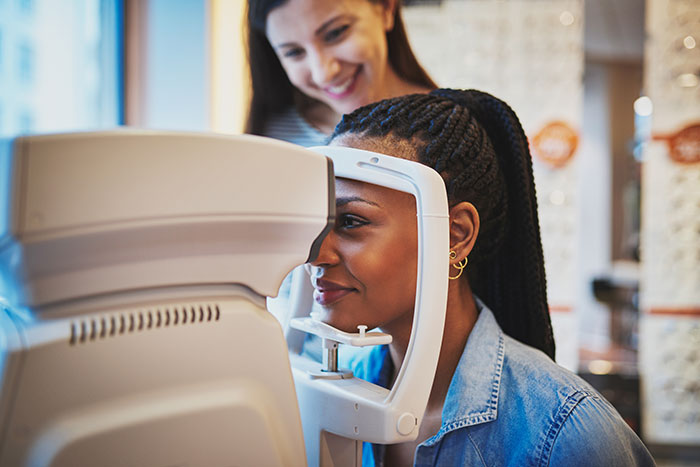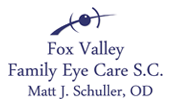At Fox Valley Family Eye Care, we are pleased to offer a wide range of optometry services for our community! Our experienced optometrists can provide you with thorough eye evaluations, determine if you need corrective lenses and your exact prescription strength, fit you with the appropriate specialty eyewear, and help you pick out the most flattering pair of glasses for your face shape and skin tone.
Our new patient appointments always begin with a comprehensive eye exam. If you are unsure of your family’s eye health history, it’s helpful to research beforehand, so we can better evaluate your own eye health. If you have never had a comprehensive exam, don’t worry! All the tests and exercises are simple and painless.

What to Expect Upon Your Visit
Upon your arrival, our receptionist will welcome you as a member of our practice. If you haven’t already done so online, we will ask you to complete a few forms. This paperwork provides us with your health history and other information related to providing you with the best vision solutions. To fill out the appropriate paperwork, please visit our Patient Center.
We’ve included a list below of the most commonly asked questions about coming in for an eye exam.
Why is my personal background important?
The doctor will review any current vision problems, your general health, as well as discuss your hobbies and lifestyle requirements to better tailor the examination to your needs.
What can I expect from the overall exam?
In addition to determining your prescription, or how well you see up close and far away, your eye examination will also check to make sure your eyes are healthy. The doctor will test your color vision, depth perception, as well as check for any early indicators of possible eye disorders, such as cataracts, retinal problems and glaucoma. Ultimately, the elements of your exam will be determined by the doctor.
Why does the doctor ask me, "Which is better, one or two?"
These questions will be asked during the portion of the examination when your prescription is established. The doctor will ask you to compare a series of lenses to determine which is clearer for you. As the differences become less noticeable, the doctor will be closer to finalizing your prescription. For this reason, if you’re having a hard time choosing between the options, it’s a good thing!
Why is it necessary to know my blood pressure?
High blood pressure can affect the blood vessels in your eyes and can lead to future vision problems.
Why am I asked to follow a light with my eyes?
This test is used to determine how your pupils and eye muscles react, and is important in assessing neurological function.
Is it necessary for doctor to dilate my pupils during the exam?
Pupil dilation is not always necessary. The doctor will make this decision during your exam. If required, this painless process is like opening a door so the doctor can fully exam the retina. Dilation can also help detect diseases like diabetes, high blood pressure and macular degeneration.
Dr. Schuller can diagnose and treat eye diseases and identify general eye health problems including diabetes, anemia, high blood pressure, and others. We can also test for and fit specialty eyewear for sports, occupations, other activities and hobbies, and safety glasses.
We can answer your questions about optometry services, our eye care practice, eye health products, and more.
Comprehensive eye exams may include:
- Testing visual acuity or refractive error
- Pupil evaluation with or without dilation
- Examination of peripheral visual field
- Color vision testing
- Analysis of the visual systems
- Examination of the external parts of the eye
- Intraocular pressure measurement
- Examination of the health of the entire eye
Our Optometric Services:
- Comprehensive eye exams
- Contact lens fittings
- Diagnosis and treatment of eye disease
- Specialized testing and care for cataracts, glaucoma, and others
- Pre-and post-operative care for eye disease
- Eye emergencies
- Foreign object removal
- Vision services for visually impaired
